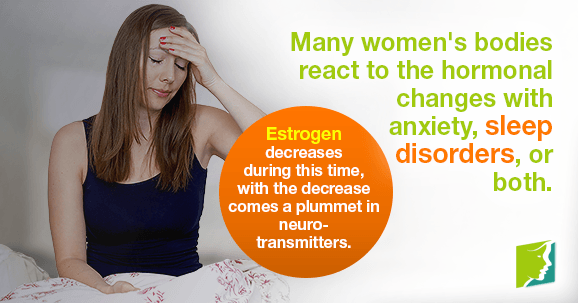Sleep disorder and anxiety often arrive strongly during drastic transitions in life, much to the dismay of menopausal women. While anxiety harms the quality of your productivity and enjoyment throughout the day, sleep disorders disrupt your restful slumber through the night.
Fatigue, irritability, and worry are challenging to fight through, and you may begin to wonder how much of your tense mental state has to do with your inability to dream sweet and recharge. On the other hand, you may wonder if a sleep disorder may be the reason for your panicky breakdowns.
The Hormonal Link
One of the most impactful bodily shifts during menopause is the drastic fluctuation in hormones. Estrogen in particular shifts and ultimately decreases during this time. This sex hormone is directly linked to your brain chemistry and ensures proper emotional response and a regular body clock. With the decrease comes a plummet in neurotransmitters that are necessary for relaxation and sleep, such as serotonin, melatonin, and endorphins.
In such case, stress hormones such as cortisol increase, making it harder to get yourself to rest not only during the day, but also through the night. Many women's bodies react to the hormonal changes with anxiety, sleep troubles, or both.
Insomnia
Insomnia is the most common sleep disorder, affecting 80% of individuals at some point in their life. Whether chronic or situational, it can cause someone to not be able to fall asleep for hours on end, and thereafter wake up frequently through the night.
This condition is more intense for someone with overwhelming anxiety, because as one lays and watches the clock tick, their worries build and build. Some individuals even experience panic episodes from their concerns and inability to attain peace of mind. With a lack of the many distractions through the day, anxiety can be worse at night.
Exhaustion
In the morning, when there is a multitude of personal or professional tasks to tend to, it can be difficult if you have not been able to sleep. The constant tired, sleepy feeling can leave you with a lack of energy and mental clarity. This can lead to fatigue, confusion, and overall mental fuzziness that can make the simplest tasks seem impossible. The buildup of this daze throughout the day can make you more and more frustrated with yourself and others to the point of an anxiety attack.
In most cases, anxiety episodes and sleep disorders are both prompted by the sharp hormonal changes during menopause. When you experience anxiety, it can strongly alter your ability to sleep through the night, and when you wake up tired, it can build and lead to worries. Though upsetting to deal with, these conditions are temporary and fade with time as your hormones fluctuate less. In the meantime, there are also ways to treat and manage them.
Sources
- National Institute of Mental Health. (n.d.). Anxiety Disorders. Retrieved May 28, 2014, from http://www.nimh.nih.gov/health/topics/anxiety-disorders/index.shtml
- National Institutes of Health. (2014). Sleep Disorders. Retrieved May 28, 2014, from http://www.nlm.nih.gov/medlineplus/sleepdisorders.html
- University of Maryland Medical Center. (2013). Adult Sleep Disorders. Retrieved May 28, 2014, from http://umm.edu/programs/sleep/health/sleep-disorders/adult




